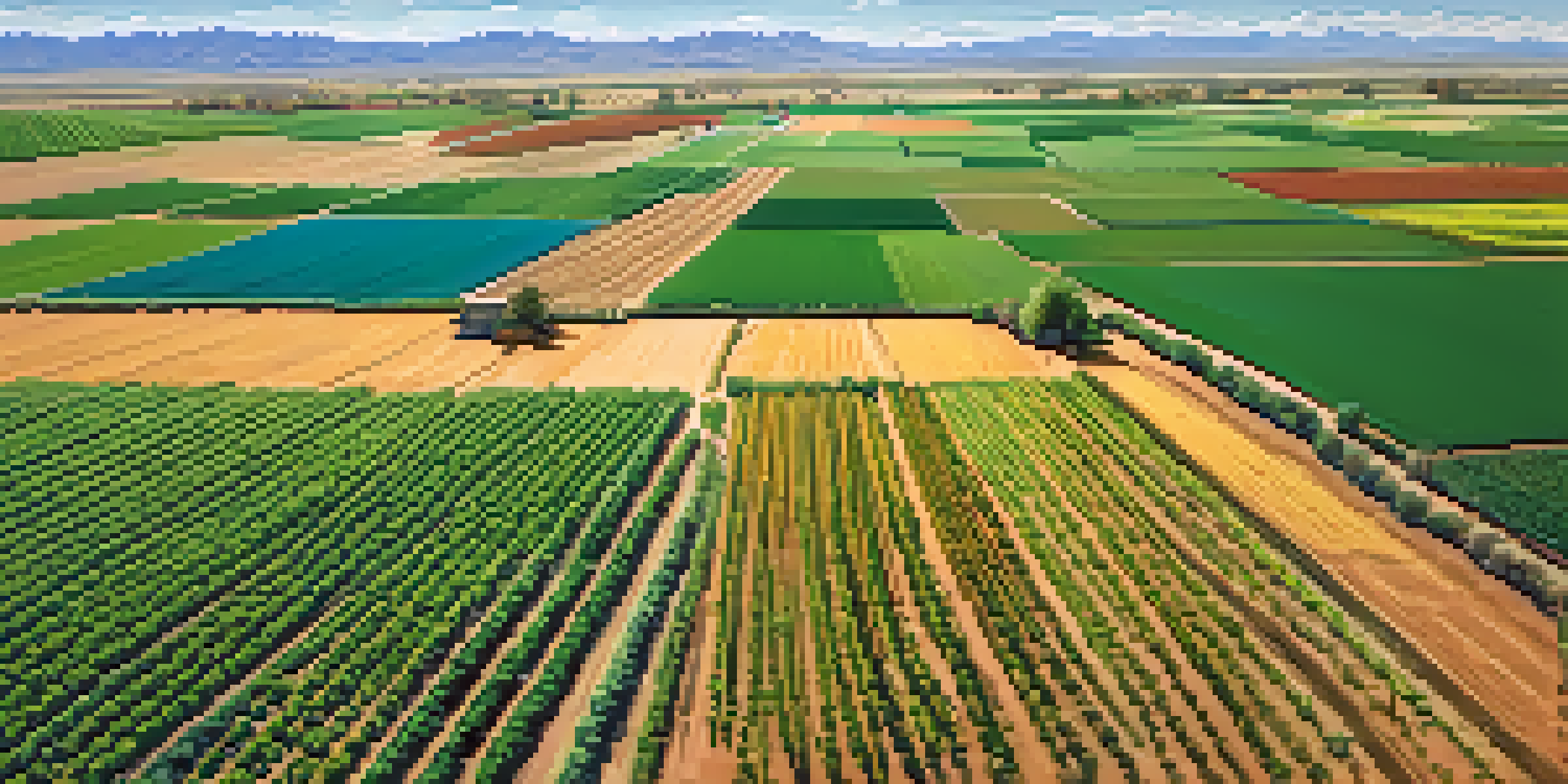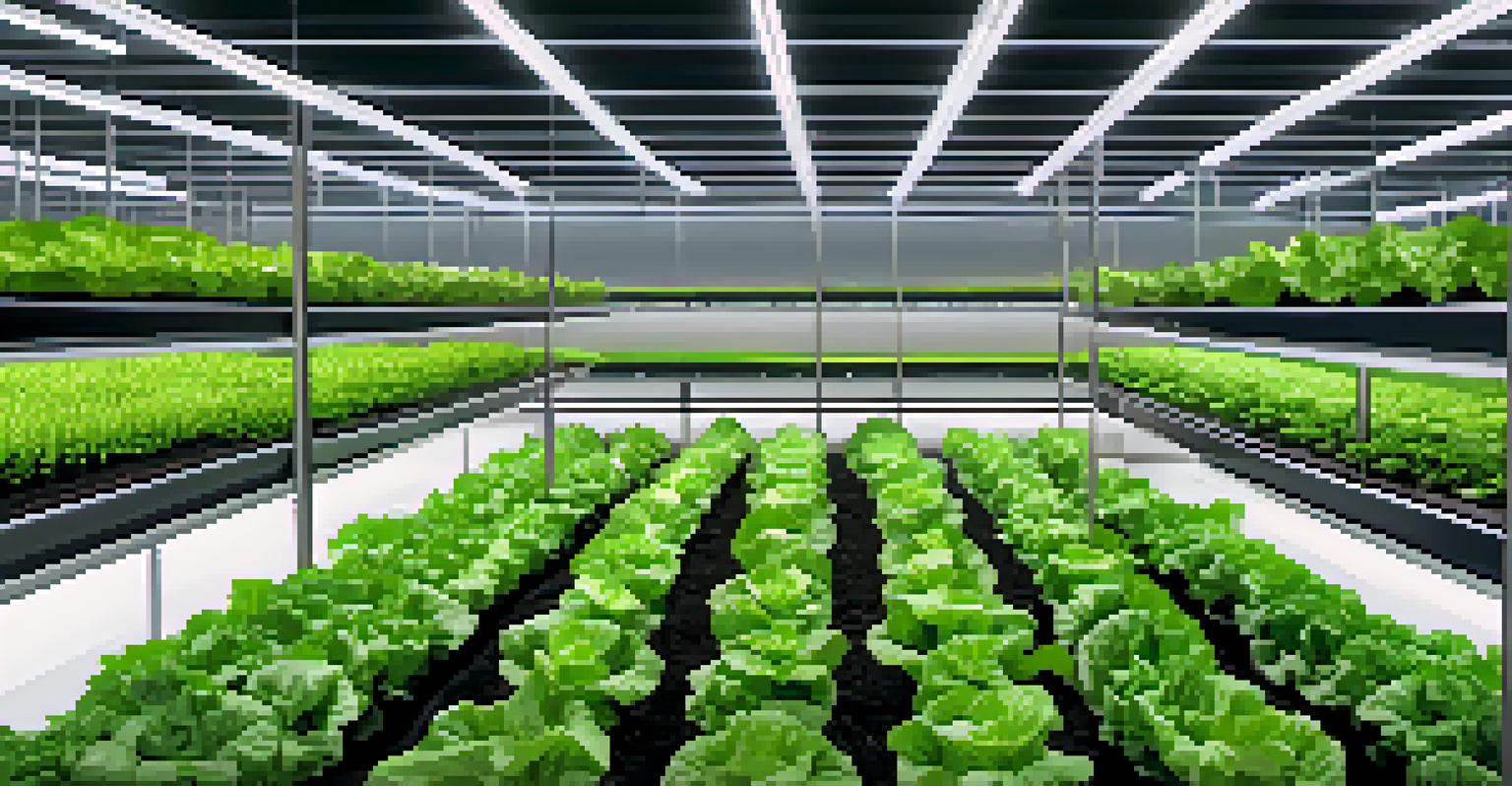Emerging Technologies Shaping Arizona's Agricultural Future

The Rise of Precision Agriculture in Arizona
Precision agriculture is revolutionizing farming practices across Arizona. By using advanced technologies like GPS and remote sensing, farmers can monitor their crops with unprecedented accuracy. This means they can apply water, fertilizers, and pesticides exactly where and when they are needed, reducing waste and boosting yields.
The farmer is the one who has to make the hard decisions. With data, we can help them make those decisions smarter and faster.
Imagine a farmer using drones to survey their fields from above, spotting areas that need attention. This kind of data-driven approach not only saves costs but also promotes sustainability. As water scarcity issues loom in Arizona, precision agriculture becomes essential in conserving this precious resource.
The benefits extend beyond just efficiency. Farmers can make informed decisions based on real-time data, allowing them to respond swiftly to changing conditions. This adaptability is crucial for the future of Arizona's agricultural sector as it faces climate challenges.
Hydroponics and Vertical Farming: A New Era
Hydroponics and vertical farming are gaining traction in Arizona's agricultural scene. These innovative methods allow crops to be grown without soil, using nutrient-rich water instead. This not only maximizes space but also reduces the amount of water needed, which is a significant advantage in a desert state.

Picture a tall building filled with rows of vibrant lettuce and herbs, all thriving indoors under artificial lights. This method can produce food year-round, regardless of weather conditions. With urban areas expanding, vertical farms can bring fresh produce closer to consumers, cutting down on transportation costs and emissions.
Precision Agriculture Boosts Yields
Advanced technologies enable Arizona farmers to optimize resources, enhancing crop productivity and sustainability.
Moreover, these systems can be implemented in areas with poor soil quality, opening up new opportunities for farming. As more Arizonans embrace hydroponics for both commercial and home use, it’s clear that this technology is shaping the future of food production.
The Role of Artificial Intelligence in Farming
Artificial Intelligence (AI) is making waves in the agricultural sector, and Arizona is no exception. Farmers are leveraging AI to analyze data from various sources, such as weather patterns and soil conditions, to make better farming decisions. This technology can predict crop yields and identify potential issues before they escalate.
Innovation in agriculture is the key to feeding the world sustainably and effectively.
Imagine a farmer receiving alerts on their smartphone about pests detected in their fields. With AI, farmers can act quickly, applying targeted treatments rather than blanket solutions. This not only saves money but also minimizes environmental impact, aligning with sustainable farming practices.
As AI continues to evolve, its applications in agriculture will expand, leading to smarter farming operations. By integrating AI into their practices, Arizona farmers can enhance productivity while addressing challenges like labor shortages and climate variability.
Blockchain Technology for Supply Chain Transparency
Blockchain technology is emerging as a powerful tool for enhancing transparency in agricultural supply chains. In Arizona, farmers can use blockchain to track the journey of their products from farm to table. This not only builds trust with consumers but also helps in ensuring food safety.
Consider the peace of mind a consumer feels knowing they can trace their food back to its source. By recording every transaction on a secure, decentralized ledger, stakeholders can verify the authenticity and quality of agricultural products. This transparency is increasingly important in a market that demands accountability.
Hydroponics Revolutionizes Food Production
Soil-less farming methods maximize space and water efficiency, transforming how food is grown in urban areas.
Furthermore, blockchain can streamline processes, reduce fraud, and lower costs associated with paperwork. As more Arizona farmers adopt this technology, the entire agricultural ecosystem stands to benefit from improved efficiency and consumer confidence.
Robotics and Automation in Crop Management
The integration of robotics and automation into crop management is transforming how farming is done in Arizona. Robotic systems can perform repetitive tasks such as planting, weeding, and harvesting, which frees up farmers to focus on higher-level strategies. This technology is especially valuable in a labor-intensive industry facing workforce shortages.
Picture a field where automated machines work tirelessly, planting seeds and monitoring plant health. These robots can operate around the clock, optimizing productivity and efficiency. With the ability to gather data on crop conditions, they also provide valuable insights for future planting strategies.
As robotics technology advances, costs are expected to decrease, making it accessible for more farmers. This shift towards automation not only enhances productivity but also supports the sustainability goals of Arizona’s agricultural sector.
Climate-Resilient Crops Through Genetic Engineering
Genetic engineering is paving the way for the development of climate-resilient crops in Arizona. With the state experiencing extreme temperatures and unpredictable weather patterns, scientists are working to breed crops that can withstand these challenges. This means developing varieties that require less water or can thrive in higher temperatures.
Imagine a drought-resistant corn plant that can still produce high yields even during dry spells. By enhancing the genetic traits of crops, farmers can secure their livelihoods and ensure food production in the face of climate change. This innovation is crucial for maintaining food security in the region.
Collaboration Drives Agricultural Innovation
Partnerships between farmers and tech companies foster new solutions to tackle modern agricultural challenges.
Moreover, genetically engineered crops can also lead to reduced reliance on chemical inputs, promoting a healthier environment. As these technologies become more accepted, they will play a significant role in shaping the future of agriculture in Arizona.
The Impact of IoT on Smart Farming Practices
The Internet of Things (IoT) is revolutionizing farming practices in Arizona by connecting devices and systems to streamline operations. Sensors placed in fields can monitor soil moisture levels, temperature, and crop health, providing real-time data to farmers. This connectivity allows for more informed decision-making.
Imagine a farmer receiving alerts on their phone when soil moisture drops below a certain threshold. With this information, they can irrigate their fields precisely when needed, conserving water and improving crop health. The integration of IoT technology helps create a more efficient and responsive agricultural system.

As IoT technology continues to evolve, its applications will expand, leading to smarter farming practices. By adopting these connected systems, Arizona farmers can not only enhance productivity but also contribute to sustainable agriculture.
The Future of Agriculture: Collaboration and Innovation
The future of agriculture in Arizona will depend heavily on collaboration and innovation across various sectors. Farmers, technology companies, and research institutions must work together to share knowledge and develop new solutions. This collaborative approach can help tackle the challenges faced by the agricultural sector.
Imagine a scenario where a farmer partners with a tech startup to create a custom app for managing their fields. By combining expertise from different fields, innovative solutions can emerge that benefit everyone involved. This synergy can lead to breakthroughs that enhance productivity and sustainability.
As Arizona continues to embrace emerging technologies, the agricultural industry is poised for transformation. With a focus on collaboration and a commitment to innovation, the state can ensure a thriving agricultural future.